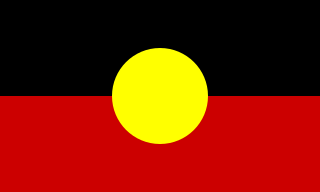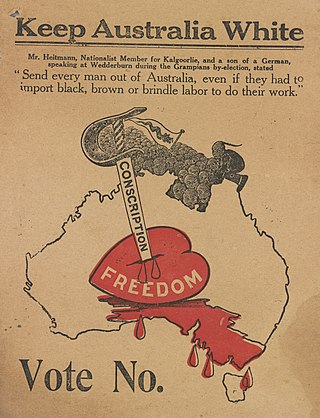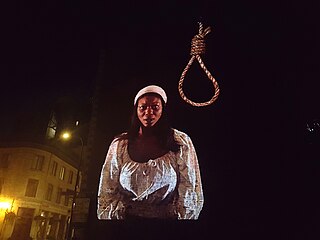Related Research Articles
Black is a racialized classification of people, usually a political and skin color-based category for specific populations with a mid- to dark brown complexion. Not all people considered "black" have dark skin; in certain countries, often in socially based systems of racial classification in the Western world, the term "black" is used to describe persons who are perceived as dark-skinned compared to other populations. It is most commonly used for people of sub-Saharan African ancestry, Indigenous Australians and Melanesians, though it has been applied in many contexts to other groups, and is no indicator of any close ancestral relationship whatsoever. Indigenous African societies do not use the term black as a racial identity outside of influences brought by Western cultures.

First Nations is a term used to identify Indigenous peoples in Canada who are neither Inuit nor Métis. Traditionally, First Nations in Canada were peoples who lived south of the tree line, and mainly south of the Arctic Circle. There are 634 recognized First Nations governments or bands across Canada. Roughly half are located in the provinces of Ontario and British Columbia.
Institutional racism, also known as systemic racism, is a form of institutional discrimination based on race or ethnic group and can include policies and practices that exist throughout a whole society or organization that result in and support a continued unfair advantage to some people and unfair or harmful treatment of others. It manifests as discrimination in areas such as criminal justice, employment, housing, healthcare, education and political representation.

Enculturation is the process by which people learn the dynamics of their surrounding culture and acquire values and norms appropriate or necessary to that culture and its worldviews.
African philosophy is the philosophical discourse produced using indigenous African thought systems. African philosophers are found in the various academic fields of present philosophy, such as metaphysics, epistemology, moral philosophy, and political philosophy. It discusses substantive issues from an African perspective.

Grave robbery, tomb robbing, or tomb raiding is the act of uncovering a grave, tomb or crypt to steal commodities. It is usually perpetrated to take and profit from valuable artefacts or personal property. A related act is body snatching, a term denoting the contested or unlawful taking of a body, which can be extended to the unlawful taking of organs alone.

Aboriginal Australians are the various Indigenous peoples of the Australian mainland and many of its islands, excluding the ethnically distinct people of the Torres Strait Islands.
Traditional knowledge (TK), indigenous knowledge (IK), folk knowledge, and local knowledge generally refers to knowledge systems embedded in the cultural traditions of regional, indigenous, or local communities.
The Djukun are an Aboriginal Australian people of the Kimberley region of Western Australia.
In property law, alienation is the voluntary act of an owner of some property to dispose of the property, while alienability, or being alienable, is the capacity for a piece of property or a property right to be sold or otherwise transferred from one party to another. Most property is alienable, but some may be subject to restraints on alienation.

Indigenous archaeology is a sub-discipline of Western archaeological theory that seeks to engage and empower indigenous people in the preservation of their heritage and to correct perceived inequalities in modern archaeology. It also attempts to incorporate non-material elements of cultures, like oral traditions, into the wider historical narrative. This methodology came out of the global anti-colonial movements of the 1970s and 1980s led by aboriginal and indigenous people in settler-colonial nations, like the United States, Canada, and Australia. Major issues the sub-discipline attempts to address include the repatriation of indigenous remains to their respective peoples, the perceived biases that western archaeology's imperialistic roots have imparted into its modern practices, and the stewardship and preservation of indigenous people's cultures and heritage sites. This has encouraged the development of more collaborative relationships between archaeologists and indigenous people and has increased the involvement of indigenous people in archaeology and its related policies.

Racism in Australia comprises negative attitudes and views on race or ethnicity which are held by various people and groups in Australia, and have been reflected in discriminatory laws, practices and actions at various times in the history of Australia against racial or ethnic groups.

Slavery in New France was practiced by some of the Indigenous populations, which enslaved outsiders as captives in warfare, until European colonization that made commercial chattel slavery become common in New France. By 1750, two-thirds of the enslaved peoples in New France were Indigenous, and by 1834, most enslaved people were African.

During and after the European colonization of the Americas, European settlers practiced widespread enslavement of Indigenous peoples. In the 15th century, the Spanish introduced chattel slavery through warfare and the cooption of existing systems. A number of other European powers followed suit, and from the 15th through the 19th centuries, between two and five million Indigenous people were enslaved, which had a devastating impact on many Indigenous societies, contributing to the overwhelming population decline of Indigenous peoples in the Americas.
The archaeology of religion and ritual is a growing field of study within archaeology that applies ideas from religious studies, theory and methods, anthropological theory, and archaeological and historical methods and theories to the study of religion and ritual in past human societies from a material perspective.

Slavery in Latin America was an economic and social institution that existed in Latin America before the colonial era until its legal abolition in the newly independent states during the 19th century. However, it continued illegally in some regions into the 20th century. Slavery in Latin America began in the pre-colonial period when indigenous civilizations, including the Maya and Aztec, enslaved captives taken in war. After the conquest of Latin America by the Spanish and Portuguese, of the nearly 12 million slaves that were shipped across the Atlantic, over 4 million enslaved Africans were brought to Latin America. Roughly 3.5 million of those slaves were brought to Brazil.

Settler colonialism is a logic and structure of displacement by settlers, using colonial rule, over an environment for replacing it and its indigenous peoples with settlements and the society of the settlers.

Detribalization is the process by which persons who belong to a particular indigenous ethnic identity or community are detached from that identity or community through the deliberate efforts of colonizers and/or the larger effects of colonialism.
Indigenous media can reference film, video, music, digital art, and sound produced and created by and for indigenous people. It refers to the use of communication tools, pathways, and outlets by indigenous peoples for their own political and cultural purposes.
Welfare colonialism is a form of colonialism where investments by the colonizer in the native population, ostensibly intended to improve their quality of life, contribute to the dissolution of indigenous institutions thus perpetuating dependency and creating a permanent underclass. Though usage of the term dates from the 1950s, the concept is often associated with anthropologist Robert Paine, who expanded and developed it while observing the failed economic integration of the native population in Northern Canada.
References
- 1 2 3 Hong, Grace Kyungwon (2015). "Blues Futurity and Queer Improvisation". Death Beyond Disavowal: The Impossible Politics of Difference. University of Minnesota Press. ISBN 9781452945484.
- ↑ Feldman, Allen (2015). Archives of the Insensible: Of War, Photopolitics, and Dead Memory. University of Chicago Press. p. 384. doi:10.7208/chicago/9780226277479.001.0001. ISBN 978-0-226-27733-2.
- ↑ Reparations: Interdisciplinary Inquiries. Oxford University Press. 2007. pp. 218–220. ISBN 9780199299911.
- ↑ Guenther, Lisa (2013). "Fanon's Critical Phenomenology of Social Death". Solitary Confinement: Social Death and Its Afterlives. University of Minnesota Press. ISBN 9780816686278.
- ↑ Bohls, Elizabeth A. (2014). Slavery and the Politics of Place: Representing the Colonial Caribbean, 1770–1833. Cambridge University Press. p. 165. ISBN 9781316148150.
- ↑ West, Cornel (1993). Prophetic Fragments. William B. Eerdmans Publishing Company. p. 161. ISBN 9780802807212.
- ↑ Sepie, Amba J. (2018). Sacred Inception: Reclaiming the Spirituality of Birth in the Modern World. Lexington Books. p. 87. ISBN 9781498546706.
- ↑ Wolfe, Patrick (2000). "White Man's Flour: The Politics and Poetics of Anthropological Discovery". Colonial Subjects: Essays on the Practical History of Anthropology. University of Michigan Press. p. 199. ISBN 9780472087464.
- ↑ Cheng, Wendy (2013). "Diversity on Main Street". The Changs Next Door to the Díazes: Remapping Race in Suburban California. University of Minnesota Press. ISBN 9781452940274.
- ↑ Tsosie, Rebecca (2000). "Sacred Obligations: Intercultural Justice and the Discourse of Treaty Rights". UCLA Law Review. 47: 1615–72 – via Indigenous Rights.